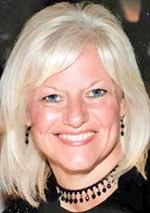Investing with Faith / Kimberly Pohovey
Donor-advised funds can be your flexible, charitable ‘checkbook’
 Sitting down to pay our bills isn’t usually much fun. But strangely, the very same activity—sending some of our money where we’ve decided to donate—can bring us great and lasting joy.
Sitting down to pay our bills isn’t usually much fun. But strangely, the very same activity—sending some of our money where we’ve decided to donate—can bring us great and lasting joy.
The difference is that when we do something because we genuinely want to do it, everything changes. And that’s certainly the case when it comes to charitable giving. As St. Paul says, “Each of you must give as you have made up your mind, not reluctantly or under compulsion, for God loves a cheerful giver” (2 Cor 9:7). In other words, once we’ve freely decided to give, joy begins to take root.
Imagine sitting down with a list of causes and deciding what to give each one of them because the funds have already been set aside. That would be less like paying a bill and more like being on the Santa side of Christmas morning!
Of course, deciding to be generous isn’t the only decision we need to make. We also need to choose what we will give, when and to whom we will give it, and how our giving will take place. For some, all those considerations can seem overwhelming enough to delay or even deter them from establishing an ongoing way to give at all.
But complicated planning requirements or ironclad structures shouldn’t keep anyone from experiencing the joy of giving. For those who are committed to charitable giving, but don’t yet have all the details worked out, a donor advised fund (DAF) may well be the best option.
Here’s how it works:
A DAF acts like a charitable investment account. A donor creates a DAF and makes an initial gift to a sponsoring organization—in this case, the Catholic Community Foundation (CCF).
CCF owns the assets and manages the fund, including investing the monies according to the U.S. Conference of Catholic Bishops’ socially responsible investing guidelines. The donor retains advisory privileges over how much, when and to whom distributions from the account are made. That means donors choose how and when to make a positive impact on the parishes, schools and ministries that are close to their hearts.
A DAF offers a simple, flexible and low-cost vehicle to support the mission of the Church here in southern and central Indiana. But there are also several other key benefits:
-
DAFs allow for hands-on philanthropic endeavors and more active participation than other vehicles for charitable giving. They offer greater protection to donors who wish to keep their gifts anonymous, as well as the opportunity to name a second generation of advisors for the fund.
-
Establishing a DAF immediately qualifies donors for a charitable income-tax deduction in the full amount of the gift, even if nothing has been distributed from the fund. Many find this helpful, particularly in a year with a large or unexpected bump in taxable income.
-
DAFs allow donors to clearly separate the funds they plan for charitable giving from their other assets while making use of compound interest as well as the Catholic Community Foundation’s smart and ethical investment strategies.
-
DAFs are a simpler, more economical and flexible alternative to a private foundation. Quicker and easier to establish with no start-up costs and substantially lower administration fees of less than 1%, a donor-advised fund is not subject to annual distribution requirements—and some can accept additional contributions in the future.
-
Every donor advised fund serves to strengthen the pool of financial resources that funds all the initiatives that make the Archdiocese of Indianapolis a faithful witness to Christ’s mercy and compassion toward all. If you’d like to learn more about donor-advised funds and whether they’re right for you, contact us at the Catholic Community Foundation at 317-236-1482 or ccf@archindy.org.
(Kimberly Pohovey is the director of major and planned gifts for the archdiocese. Tax or legal information provided herein is not intended as tax or legal advice. Always consult with your legal, tax or financial advisors before implementing any gift plan. If you would like to learn more about including your parish in your estate plans, please contact us any time. We exist to exclusively serve you and your parish in planned giving.) †
 Sitting down to pay our bills isn’t usually much fun. But strangely, the very same activity—sending some of our money where we’ve decided to donate—can bring us great and lasting joy.
Sitting down to pay our bills isn’t usually much fun. But strangely, the very same activity—sending some of our money where we’ve decided to donate—can bring us great and lasting joy.